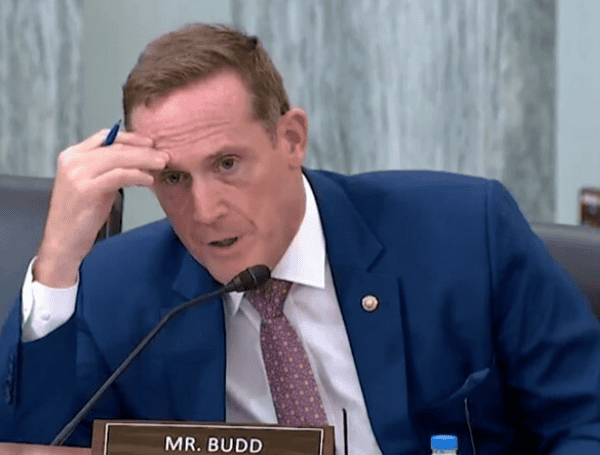During a Senate Commerce and Technology Committee hearing on Wednesday, Senator Ted Budd (R-NC) addressed experts on the growing cybersecurity threats posed by Chinese technology providers, particularly Huawei and ZTE. The discussion focused on China’s influence on global telecommunications and the steps needed to secure U.S. networks.
Highlighting the recent Salt Typhoon hack, a Chinese cyber espionage operation targeting critical U.S. infrastructure, Budd expressed concern over the scale of Chinese efforts to infiltrate American telecommunications. He called attention to the gaps in U.S. defenses and emphasized the need to deter state-sponsored cyber threats.
READ: Legal Group Launches Investigation Into DOJ Memo Targeting Parents In Virginia
“This speaks to the massive scale of Chinese efforts to infiltrate America’s telecommunications infrastructure,” Budd said. “There’s a mismatch between the scope of the threat and our ability to harden networks or deter maligned state actors like China from trying again.”
Budd pointed to Chinese companies’ dominance in the telecommunications sector, fueled by heavy subsidies and commercial espionage. He praised the inclusion of funding in the National Defense Authorization Act (NDAA) for the “rip-and-replace” program, which removes compromised Chinese hardware from U.S. networks.
Budd asked Dr. Malvin, a cybersecurity expert, what additional measures the U.S. could take to counter Huawei and ZTE’s global dominance. Dr. Malvin emphasized the importance of adopting open radio access networks (OpenRAN) and fostering international collaboration.
“OpenRAN provides an opportunity to escape the royalties and patents trap set by Huawei through 5G standard-setting processes,” Dr. Malvin explained. He noted that OpenRAN allows for open-source cooperation between companies across the U.S., Europe, and allied nations, creating a viable alternative to Huawei’s end-to-end telecommunications solutions, particularly in developing regions like Africa and Southeast Asia.
READ: Reports Of Drones Over U.S. Capitol Stir Speculation Amid Ongoing Drone Sightings Across The U.S.
Dr. Malvin also stressed the importance of breaking down antitrust barriers between Western companies like Nokia, Ericsson, Cisco, and Juniper, enabling them to compete effectively against Huawei’s dominance.
Budd expressed interest in why OpenRAN, despite its advantages, has only recently gained prominence in discussions. Dr. Malvin explained that earlier versions of OpenRAN lacked the robustness to handle high-tier traffic. However, substantial investments have since made OpenRAN a mature and credible alternative for carriers.
“There’s now a lot of confidence in OpenRAN’s capability to provide robust telecommunications services while offering a secure alternative to Huawei’s equipment,” Dr. Malvin said.
The discussion also touched on the challenges faced by smaller telecommunications providers in navigating overlapping cybersecurity requirements from various agencies. Patrick Donovan, a cybersecurity specialist, called for streamlined regulations to reduce complexity and encourage private-sector investment in cybersecurity.
“A coordinated response, building on existing frameworks instead of creating new ones, would help smaller operators navigate cybersecurity requirements,” Donovan stated.
Budd agreed, noting that simplifying regulations could ease the burden on smaller providers and enhance cybersecurity readiness across the telecommunications sector.
The hearing underscored the urgency of addressing vulnerabilities in U.S. telecommunications infrastructure and reducing dependence on Chinese technology providers. Budd’s focus on OpenRAN and streamlined cybersecurity policies reflects growing bipartisan efforts to secure American networks and strengthen international cooperation in the face of emerging threats.
Please make a small donation to the Tampa Free Press to help sustain independent journalism. Your contribution enables us to continue delivering high-quality, local, and national news coverage.
Connect with us: Follow the Tampa Free Press on Facebook and Twitter for breaking news and updates.
Sign up: Subscribe to our free newsletter for a curated selection of top stories delivered straight to your inbox.

